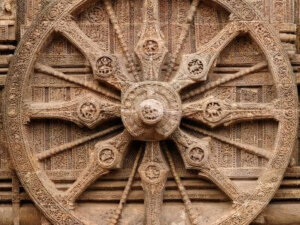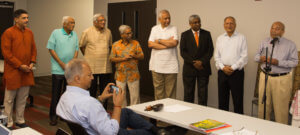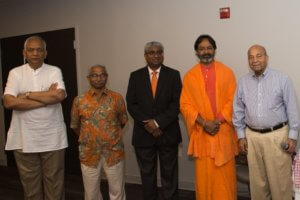From: $300.00 every 3 months for 12 months and a $100.00 sign-up fee
The 9-quarter-credit-hour Micro Certificate in Spoken Samskritam enables students with prior Devanāgari (Script) knowledge to achieve conversational proficiency in Saṃskṛtam focusing on speaking, listening, reading, and comprehension skills.
Description
Micro-Certificate in Conversational Sanskrit for Hindu Studies
Program Code:
MCCS
Course Codes:
0001 - 0004
Credit Hours:
6 Quarter-Credit-Hours
Duration:
1 year

Program Description
The Micro Certificate in Conversational Sanskrit for Hindu Studies (MCCS) is a 4-quarter, 6 Credit-hour program designed to help students with prior knowledge of the Devanāgari script and Sanskrit grammar but no fluency in spoken Saṃskṛtam, develop conversational proficiency in the Saṃskṛtam language. Through the use of real-life scenarios, vocabulary, and skits, this program aims to enable students to speak Saṃskṛtam fluently and understand it easily. The program focuses on various aspects such as correct pronunciation while reading (paṭhanam), writing comprehensible sentences and paragraphs without errors (lekhanam), developing listening skills (śravaṇam), conversing in grammatically accurate Sanskritam that others can comprehend (sambhāṣaṇam), and being able to comprehend both spoken and written Saṃskṛtam without assistance (avagamanam). This program is suitable for students of all ages, high school onwards.
Program Learning Outcomes
At the completion of the program of study, students will be able to:
- Enhance Listening and Pronunciation
- Demonstrate Comprehension
- Develop Vocabulary and Grammar
- Communicate in Saṃskṛtam
- Compose in Saṃskṛtam
At the completion of these 6 courses, students have the option to take up further studies in Sanskrit language through the other Saṃskṛtam Programs at HUA.
Students will be able to participate in a “Higher Education” ecosystem that supports and enables advanced learning in Hindu studies as well as Sanskrit literary studies.
Who is this Program for?
The MCCS program is specifically designed for students who have a strong passion for learning and speaking a new language, particularly Saṃskṛtam. One of the most effective ways to learn and fully embrace a language is by actively speaking it. This program offers a unique opportunity for language enthusiasts to immerse themselves in a relaxed and informal learning environment, allowing them to apply their newfound language skills in their everyday lives. Students of all ages, starting from high school, are encouraged to join this course and embark on an exciting language learning journey.
Prerequisites for the Program:
No prior knowledge of spoken Saṃskṛtam is assumed. However, students are required to have reading and writing skills in the Devanagari script and completion of Beginner Phase of Certificate Program in Sanskrit Proficiency for Vedic Studies or its equivalent. The medium of instruction is in Saṃskṛtam and English, but as students progress in their proficiency, the language of instruction will gradually shift to Saṃskṛtam at a comfortable and easily understandable pace.
How long will this program take?
The Program of Study for Conversational Sanskrit will take 1 year, divided into 4 quarters.
Structure of the Program
The Program of Study for Conversational Sanskrit is divided into 4 quarters, with 1.5-credit hours per quarter, totaling 15 hours of instruction and 30 hours of self-study per quarter. To complete this program, students must earn 6 credits. It is highly recommended for students to enroll in this microprogram and complete it in its entirety in order to maximize the benefits. Taking courses on an à la carte basis is not advised or allowed.
About Sanskrit Language:
The word Sanskrit or ‘saṃs-kṛta’ means ‘completely – made’ and it signifies the Sanskrit language as one that is complete in terms of being able to convey precise and unambiguous contextual meaning. Rooted in a well understood etymology, the Sanskrit language provides a framework for communicating thought with deep meaning and simplicity. Because of its inherent perfect architecture, Sanskrit has remained largely unchanged over the centuries.
About Sanskrit Words:
Sanskrit words are formed with various combinations of vowels and consonants, together called akśarāṇi, based on a finite set of rules. Importantly, the sounds of each akśaram (syllable) is based on a particular placement combination of the tongue, back side of the mouth, lips and the out breath. Sanskrit words and the resulting Sanskrit language were originally used in spoken form.
About spoken Sanskrit:
The original use case for the everyday Sanskrit language was spoken communication. This is a key reason why Saṃskṛtam never needed a particular script. Saṃskṛtam words and the resulting Saṃskṛtam language can therefore be written in any script, and devanāgari is the most commonly used script. While it may seem daunting initially, spoken Sanskrit skills can in fact be developed quickly. The alphabets in the Sanskrit language make specific sounds based on the placement combination of the tongue, back side of the mouth, lips and the out breath. Combining these alphabets into Sanskrit words and their subsequent combination to make complete sentences result quite intuitively when the combination rules are understood correctly.
Program Context:
Learning a language is a remarkable journey that taps into our innate ability to listen and speak. Speaking a language enables us to grasp its intricacies, from intonation to grammar, vocabulary, and context. The joy of mastering a new language is indescribable, as each word learned and every grammar rule applied feels like leveling up in a game.
Saṃskṛtam, known as deva-bhasha (the language of the gods), holds immense significance. It was in this divine language that Sri Krishna and Arjuna engaged in their famous dialogue (Bhagavadgītā). The Hindu University of America recognizes Saṃskṛtam as a vibrant language that enriches civilization and culture, offering profound insights into wisdom, philosophy, and spirituality. In the Micro-Certificate in Conversational Sanskrit for Hindu Studies program, we embrace Saṃskṛtam as a living language, prioritizing speaking, listening, and understanding. By becoming fluent in spoken Saṃskṛtam, you open yourself up to a vast range of spoken works. Embarking on this program is an amazing opportunity to embark on your language-learning journey.
X
Micro-Certificate in Conversational Sanskrit for Hindu Studies
The tuition fee per credit hour for MCCS courses is $200. The total cost of the complete certificate program with 6 credit hours is $ 1200, plus a one time non-refundable administration fee of $100, making it a total of $ 1300. However the following payment options are available.
- Pay upfront for the full 1 year Program: Total cost $ 1100
- Pay by Quarter for the full 1 year Program: Total cost $ 1300
Payment Plan Options:
- Pay in full for the full 1 year Program: $ 1100
- Pay by Quarter for the Full Program: $ 1300
From: $300.00 every 3 months for 12 months and a $100.00 sign-up fee
Before you choose a payment plan, and get enrolled in the Certificate Program in Sanskrit Proficiency. Please make sure that you have completed the following steps:
- Applied for the Program.
- Reviewed the enrollment agreement form.
- Determined your payment plan.
After all of the above steps have been completed, please choose a payment plan below and pay your fees.
Select a payment plan below:
X
Tuition and Payment Plans
The tuition fee per credit hour for MCCS courses is $200. The total cost of the complete certificate program with 6 credit hours is $ 1200, plus a one time non-refundable administration fee of $100, making it a total of $ 1300. However the following payment options are available.
- Pay upfront for the full 1 year Program: Total cost $ 1100
- Pay by Quarter for the full 1 year Program: Total cost $ 1300
Payment Plan Options:
- Pay in full for the full 1 year Program: $ 1100
- Pay by Quarter for the Full Program: $ 1300
X
FBL Examples
Example # 1:
Priya (a hypothetical student) is interested in learning more about her family’s ancestral lineage and in enhancing her knowledge and practice of yoga in India. She lives in the United States and is the mother of a young child, so she will not be able to stay at a Yoga Gurukulam for an extended period of time. Priya has located a particular site for her FBL, which meets the criteria. They understand her responsibilities and have told her that a one or two-week stay at the Gurukulam is sufficient; she is able to manage this. She will participate in online courses with the Gurukulam, before and after her stay and is already thinking about how she can make connections with her HUA coursework in Yoga Sutras of Patanjali and other Yoga related courses.
Example # 2:
Kevin (a hypothetical student) is a musician who has been drawn to the spiritual foundations of Bhakti music. He lives in the USA, and is part of a Performing Arts Orchestra, who has been dabbling with his own musical creations based on the Vedic teachings. He is able to visit India for an extended period of time, and designs a 3-month immersion experience for his FBL with a Partner institution in India, which specializes in Classical Indian Music. He is also simultaneously learning Sanskrit through HUA and will be working on developing a deeper appreciation of the lyrics and their meanings from within a Hindu spiritual context. He will be making connections between his HUA coursework on Sanskrit as well as in Hindu Philosophy with the compositions of the Bhakti saints of various genres through his FBL.
Example #3:
Darshana (a hypothetical student) is interested in understanding the Ashram experience more fully. She is able to spend a substantial amount of time at an Ashram in the United States. She combines that experience with a quick 3-week Ashram tour of India to Rishikesh, Coimbatore and Belur, where she is able to develop an immersive understanding of the Ashram experience across multiple Hindu traditions. Her FBL is managed through the relationship with the Ashram in the USA and is able to also incorporate the 3-week travel to India to visit and experience several Ashrams. Through these varied Ashram experiences, she is able to incorporate new practices in her own life, after experimenting briefly with multiple practices being offered at these various sites.
Additional information
| Payment Plan | Pay in Full, Pay in Quarter |
|---|
Related products
-

Master of Arts in Hindu Studies
From: $320.00 / month for 60 months and a $100.00 sign-up feeIn stock
Select options This product has multiple variants. The options may be chosen on the product page -

Advanced Certificate in Sanskrit Grammar for Hindu Studies
From: $1,500.00 / year for 3 years and a $100.00 sign-up feeIn stock
Select options This product has multiple variants. The options may be chosen on the product page -

The Mahabharata Certificate
From: $275.00 / month and a $100.00 sign-up feeIn stock
Select options This product has multiple variants. The options may be chosen on the product page -

Certificate Program in Hindu Studies
From: $300.00 every 3 months for 48 months and a $100.00 sign-up feeIn stock
Select options This product has multiple variants. The options may be chosen on the product page











